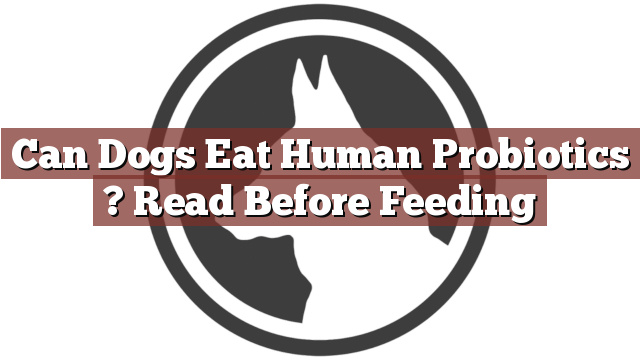Understanding Your Dog’s Dietary Needs
As responsible pet owners, it is essential to understand our dog’s dietary needs. Dogs have specific nutritional requirements that are different from humans. While they can consume some human foods, it is crucial to ensure that it is safe and beneficial for their health. A balanced diet consisting of high-quality dog food is usually sufficient to meet their nutritional needs. However, sometimes we may wonder if we can supplement their diet with human probiotics.
Can Dogs Eat Human Probiotics? Read Before Feeding
Can dogs eat human probiotics? This is a common question among dog owners who are seeking ways to improve their furry friend’s gut health. The answer is yes, dogs can consume human probiotics, but with caution. Probiotics are beneficial bacteria that can help maintain a healthy balance in the gut. They can promote digestion, boost the immune system, and alleviate certain digestive issues in dogs. However, it is essential to consult with a veterinarian before introducing human probiotics into your dog’s diet.
Pros and Cons of Feeding Human Probiotics to Your Dog
Feeding human probiotics to your dog can have both pros and cons. One of the significant advantages is that probiotics can improve your dog’s gut health. They can help regulate digestion, reduce diarrhea, and enhance nutrient absorption. Additionally, probiotics can be beneficial for dogs with certain health conditions such as allergies, inflammatory bowel disease, or after a course of antibiotics.
However, there are some potential drawbacks to consider as well. Human probiotics may not contain the specific strains of bacteria that are most beneficial for dogs. Moreover, the dosage might not be suitable for canines, as their digestive system is different from ours. It is also crucial to note that some human probiotics contain additives or ingredients that may be harmful to dogs. Therefore, it is vital to choose probiotics specifically formulated for dogs or consult a veterinarian for guidance.
Conclusion: Considerations for Feeding Your Dog Human Probiotics
Can my dog eat human probiotics? While it is generally safe to give your dog human probiotics, there are several considerations to keep in mind. First and foremost, always consult with your veterinarian before introducing any new supplements or dietary changes. They can guide you in selecting the right probiotic for your dog’s specific needs.
If your veterinarian approves the use of human probiotics, ensure that you choose a reputable brand that specializes in probiotics for dogs. This will ensure that the product contains the appropriate strains and dosage for your furry friend’s digestive system. Additionally, closely monitor your dog’s response to the probiotics and watch out for any adverse reactions or changes in their health.
In conclusion, while human probiotics can be beneficial for dogs, it is essential to proceed with caution. Consulting with a veterinarian and choosing the appropriate probiotic formulated for dogs are essential steps to ensure your pet’s well-being. By understanding your dog’s dietary needs and making informed decisions, you can help promote a healthy gut and overall health for your beloved canine companion.
Thank you for taking the time to read through our exploration of [page_title]. As every dog lover knows, our furry friends have unique dietary needs and responses, often varying from one canine to another. This is why it's paramount to approach any changes in their diet with caution and knowledge.
Before introducing any new treats or making alterations to your dog's diet based on our insights, it's crucial to consult with a veterinarian about [page_title]. Their expertise ensures that the choices you make are well-suited to your particular pet's health and well-being.
Even seemingly harmless foods can sometimes lead to allergic reactions or digestive issues, which is why monitoring your dog after introducing any new food item is essential.
The content provided here on [page_title] is crafted with care, thorough research, and a genuine love for dogs. Nevertheless, it serves as a general guideline and should not be considered a substitute for professional veterinary advice.
Always prioritize the expert insights of your veterinarian, and remember that the health and happiness of your furry companion come first.
May your journey with your pet continue to be filled with joy, love, and safe culinary adventures. Happy reading, and even happier snacking for your canine friend!

